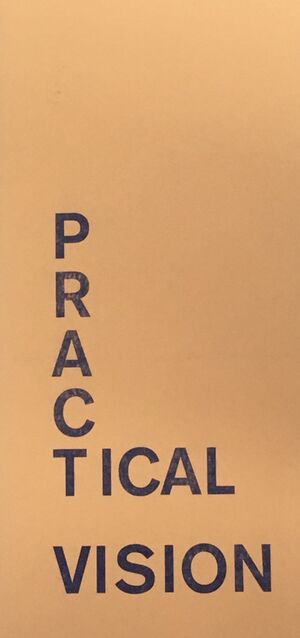Practical Vision ISSUE13: Difference between revisions
mNo edit summary |
|||
| (2 intermediate revisions by one other user not shown) | |||
| Line 1: | Line 1: | ||
[[File:Practical vision.jpeg|frameless|right|Cover of Practical Vision]] | |||
==Practical Vision== | ==Practical Vision== | ||
| Line 11: | Line 12: | ||
*[https://pad.xpub.nl/p/practicalvisionnotes Pad with notes] | *[https://pad.xpub.nl/p/practicalvisionnotes Pad with notes] | ||
=Our summary of the text= | |||
The text Practical Vision is about a pan-African collective of young writers from all over the African continent called Jalada. The collective was born from the | The text Practical Vision is about a pan-African collective of young writers from all over the African continent called Jalada. The collective was born from the initiative of enhancing language and knowledges from geographical location of each participant. | ||
Jalanda embarked on a translation project in which they aimed to have one short story translated into as many languages as possible, knowing that over 2000 languages exist across the 54 nations of Africa. | Jalanda embarked on a translation project in which they aimed to have one short story translated into as many languages as possible, knowing that over 2000 languages exist across the 54 nations of Africa. | ||
| Line 26: | Line 27: | ||
Over the course of ten years, they plan to have translations of about ten different stories, with each story translated into a hundred or more languages, conversing with each others. It is about taking advantage of digital technologies to prone a multilangual platform that would be easily accessible and which would also allow to be a writer, publisher, reader at the same time. | Over the course of ten years, they plan to have translations of about ten different stories, with each story translated into a hundred or more languages, conversing with each others. It is about taking advantage of digital technologies to prone a multilangual platform that would be easily accessible and which would also allow to be a writer, publisher, reader at the same time. | ||
=Making a summary of this text: our process= | |||
Each one of us puts the essence of a paragraph in one or two sentences. After that we pasted all these sentences together. After having a strange summary we deleted some sentences and changed it to make a more readable and easier to read entity. | Each one of us puts the essence of a paragraph in one or two sentences. After that we pasted all these sentences together. After having a strange summary we deleted some sentences and changed it to make a more readable and easier to read entity. | ||
Latest revision as of 09:47, 13 October 2020
Practical Vision
Practical Vision is one word of the ten Words of the Future. Federico, Martin and Floor made annotations, discussed the meaning and summarised the text.
Our process in pads
Our summary of the text
The text Practical Vision is about a pan-African collective of young writers from all over the African continent called Jalada. The collective was born from the initiative of enhancing language and knowledges from geographical location of each participant.
Jalanda embarked on a translation project in which they aimed to have one short story translated into as many languages as possible, knowing that over 2000 languages exist across the 54 nations of Africa. The goal of Jalada is to transform our attitudes towards the use of our mother tongues and those we use in our daily interactions. Although distinctive African languages are used by millions of people every day, most of the written material is in European languages as well as a few dominant African national languages. The illusion of unifying a nation through a single language is wide spread. This has meant a very deliberate marginalisation of African languages and the almost brutal emphasis on the spread and dominance of English or other European languages.
Practical vision is about disseminating African literature taking advantage of digital facilities by one short story a year, translated into as many African languages as possible, on an online collaborative archive.
The second step is about establishing a base of devoted readers to share this work all over the Internet, and also to collaborate with universities and other learning institutions, create interest or integrate the idea of African languages in research and teaching practices.
For example, one story was translated in three Gambian Languages (Wolof, Mandinka, and Fula) and publishers across Spain printed editions in Spanish, Catalan, Galician, Basque, Bable, and Occitan. In India, a print publication of a translation in Kannada, a Dravidian language. In the USA the story was published as eBook available on the subway for a year. There are more than six thousand nine hundred more languages across the world, and so the story travels, also with the digital and the analogue which co-exists in mutual advantage.
Over the course of ten years, they plan to have translations of about ten different stories, with each story translated into a hundred or more languages, conversing with each others. It is about taking advantage of digital technologies to prone a multilangual platform that would be easily accessible and which would also allow to be a writer, publisher, reader at the same time.
Making a summary of this text: our process
Each one of us puts the essence of a paragraph in one or two sentences. After that we pasted all these sentences together. After having a strange summary we deleted some sentences and changed it to make a more readable and easier to read entity.

